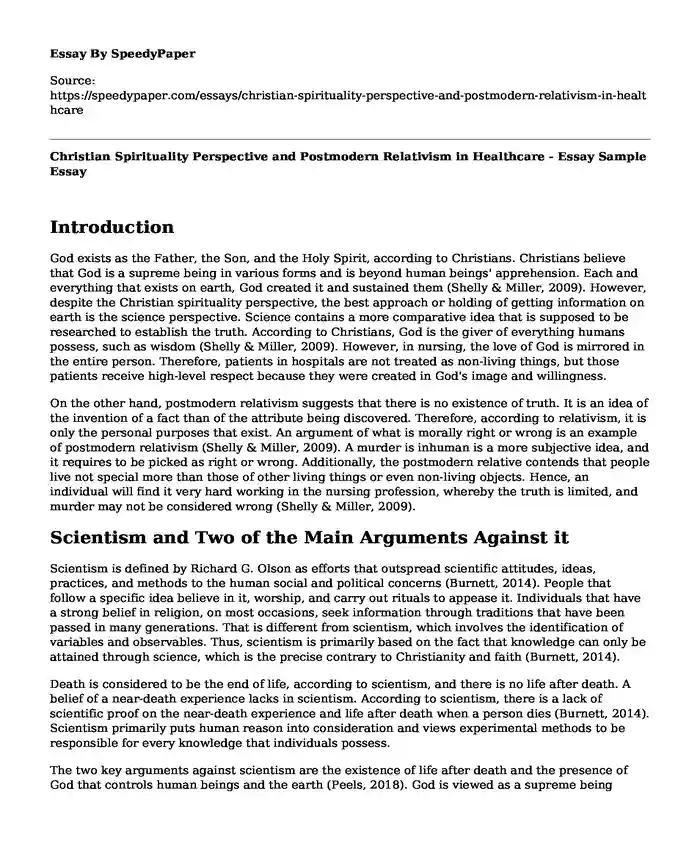
| Type of paper: | Essay |
| Categories: | Health and Social Care Nursing Science Religion Ethics God Christianity |
| Pages: | 3 |
| Wordcount: | 624 words |
Introduction
God exists as the Father, the Son, and the Holy Spirit, according to Christians. Christians believe that God is a supreme being in various forms and is beyond human beings' apprehension. Each and everything that exists on earth, God created it and sustained them (Shelly & Miller, 2009). However, despite the Christian spirituality perspective, the best approach or holding of getting information on earth is the science perspective. Science contains a more comparative idea that is supposed to be researched to establish the truth. According to Christians, God is the giver of everything humans possess, such as wisdom (Shelly & Miller, 2009). However, in nursing, the love of God is mirrored in the entire person. Therefore, patients in hospitals are not treated as non-living things, but those patients receive high-level respect because they were created in God's image and willingness.
On the other hand, postmodern relativism suggests that there is no existence of truth. It is an idea of the invention of a fact than of the attribute being discovered. Therefore, according to relativism, it is only the personal purposes that exist. An argument of what is morally right or wrong is an example of postmodern relativism (Shelly & Miller, 2009). A murder is inhuman is a more subjective idea, and it requires to be picked as right or wrong. Additionally, the postmodern relative contends that people live not special more than those of other living things or even non-living objects. Hence, an individual will find it very hard working in the nursing profession, whereby the truth is limited, and murder may not be considered wrong (Shelly & Miller, 2009).
Scientism and Two of the Main Arguments Against it
Scientism is defined by Richard G. Olson as efforts that outspread scientific attitudes, ideas, practices, and methods to the human social and political concerns (Burnett, 2014). People that follow a specific idea believe in it, worship, and carry out rituals to appease it. Individuals that have a strong belief in religion, on most occasions, seek information through traditions that have been passed in many generations. That is different from scientism, which involves the identification of variables and observables. Thus, scientism is primarily based on the fact that knowledge can only be attained through science, which is the precise contrary to Christianity and faith (Burnett, 2014).
Death is considered to be the end of life, according to scientism, and there is no life after death. A belief of a near-death experience lacks in scientism. According to scientism, there is a lack of scientific proof on the near-death experience and life after death when a person dies (Burnett, 2014). Scientism primarily puts human reason into consideration and views experimental methods to be responsible for every knowledge that individuals possess.
The two key arguments against scientism are the existence of life after death and the presence of God that controls human beings and the earth (Peels, 2018). God is viewed as a supreme being whose powers supersedes science. Since science is majorly focused on what human beings can see and physically appreciate, it inclines to shift away from beliefs concerning supernatural powers. However, scientism is supposed to have a deeper understanding of every kind of faith and belief, even if some issues may not be scientifically proven (Peels, 2018). Reincarnation can be considered to be scientific on life after death. The reincarnation process has support from both some scientists and Christians, and yet it has not to be proven. Not everything requires scientific proof; some things should be accepted through faith.
References
Burnett, T. (2014). What Is Scientism?. American Association for the Advancement of Science, accessed 13.
Peels, R. (2018). The fundamental argument against scientism. Science Unlimited? The Challenges of Scientism, 165-184.
Shelly, J. A., & Miller, A. B. (2009). Called to care: A Christian worldview for nursing. InterVarsity Press.
Cite this page
Christian Spirituality Perspective and Postmodern Relativism in Healthcare - Essay Sample. (2023, Dec 28). Retrieved from https://speedypaper.com/essays/christian-spirituality-perspective-and-postmodern-relativism-in-healthcare
Request Removal
If you are the original author of this essay and no longer wish to have it published on the SpeedyPaper website, please click below to request its removal:
- Learn Anthropology Linguistics in This Free Essay
- Free Essay on Biostatistics and Epidemiology
- Free Essay Example on Social Media Impact on Protests
- Website Review. Paper Example
- Right to Privacy and Abortion. Essay Example
- Ocean-Ocean Convergence - Free essay
- Social Media and Its Impact on Mental Health - Free Paper Example
Popular categories




